The event, held under the co-chairmanship of Malaysian Minister of Defense Dato' Seri Mohamed Khaled bin Nordin and Japanese Minister of Defense Koizumi Shinjiro, provided an opportunity for ASEAN and Japan’s defense ministers to discuss issues of common concern and promote defense cooperation.
    |
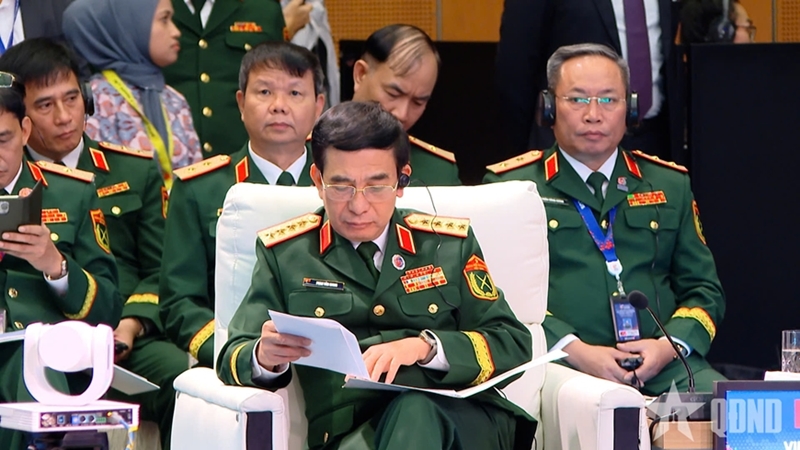 |
|
General Phan Van Giang attends the ASEAN - Japan Informal Defense Ministers’ Meeting. |
During the meeting, the ministers commended the strong and dynamic development of ASEAN - Japan cooperation, describing it as a model of a comprehensive and mutually beneficial strategic partnership in the region.
The organization of the meeting reflected the two sides’ desire to strengthen defense cooperation in line with their Comprehensive Strategic Partnership. Acknowledging the vast potential for collaboration, both sides reaffirmed their commitment to deepening defense ties.
Japanese Minister of Defense Koizumi Shinjiro reaffirmed Japan’s support for ASEAN centrality, stressing that peace and stability in the East China Sea and the East Sea (also known as South China Sea) are vital to regional peace and security. He expressed the wish to elevate ASEAN - Japan defense cooperation to a new height.
    |
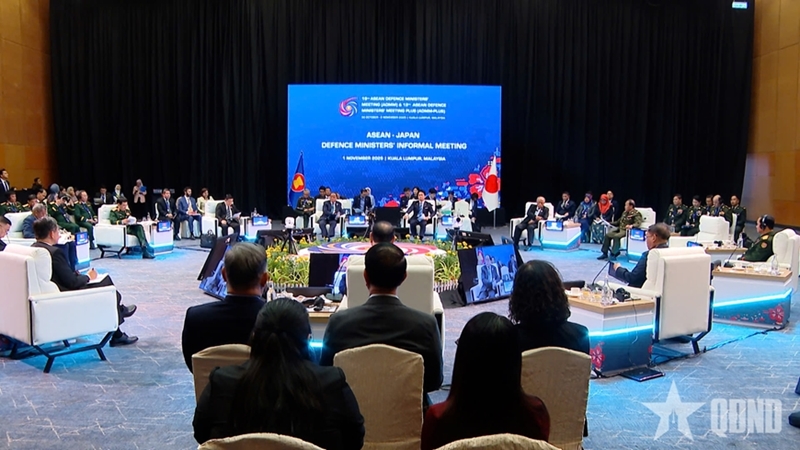 |
|
A view of the ASEAN - Japan Informal Defense Ministers’ Meeting |
Speaking at the meeting, General Phan Van Giang emphasized that ASEAN - Japan defense cooperation plays an increasingly important role in the regional security architecture with ASEAN at its center. He recognized Japan as an active and responsible member within the ADMM+ framework and proposed that future cooperation focus on three key areas.
The first one is humanitarian assistance and disaster relief. Highlighting Japan’s leading experience in this field, General Giang suggested that both sides enhance information exchange and cooperation to improve search-and-rescue capabilities and disaster response.
The second area is maritime cooperation. General Giang affirmed Vietnam’s support for Japan and the Philippines as co-chairs of the ADMM+ Experts’ Working Group on Maritime Security for the 2024–2027 cycle. Vietnam is ready to actively contribute to the group’s initiatives to ensure maritime security, safety, and freedom of navigation in the region.
The last is addressing non-traditional security challenges. The Vietnamese Defense Minister proposed that both sides continue successful cyber-security cooperation and expand to other potential areas where Japan has strengths and ASEAN has demand, such as environmental security, space security, and advanced technology.
    |
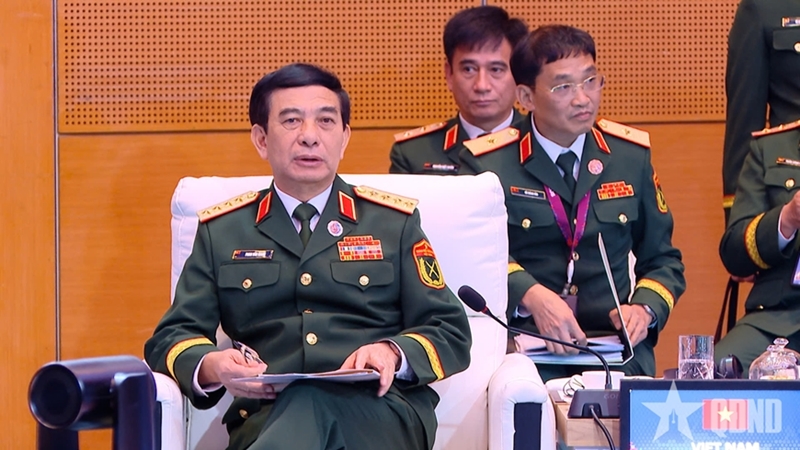 |
|
The Vietnamese Defense Minister attends the tea reception. |
He expressed confidence that with the foundation of friendship, strategic trust, and shared determination, ASEAN - Japan defense cooperation will continue to grow strongly and contribute to peace, stability, and sustainable development in the region and the world.
* Also on November 1 in Kuala Lumpur, General Phan Van Giang attended a tea reception between ASEAN defense ministers and U.S. Secretary of War Pete Hegseth.
Secretary Hegseth reaffirmed that the U.S. values the ADMM+ as a key mechanism of the regional security architecture. He expressed the U.S.'s wish to enhance defense cooperation with ASEAN in a practical and effective manner for regional peace and stability. He emphasized the importance of maritime security to regional stability and the need to maintain free and open sea lanes in accordance with international law.
    |
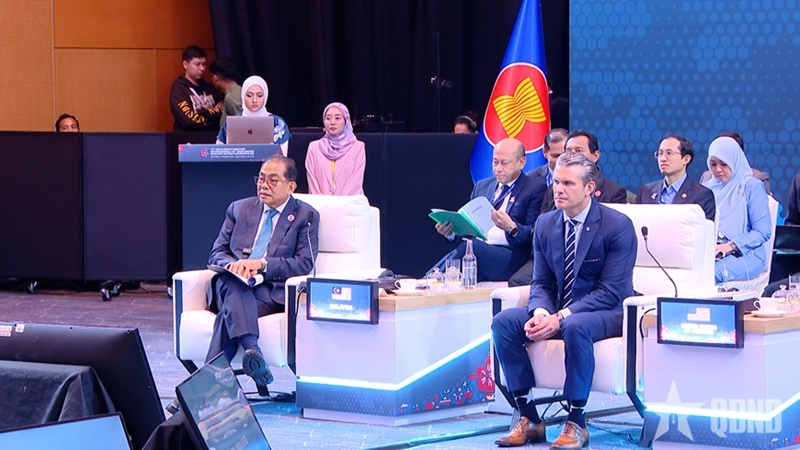 |
|
U.S. Secretary of War Pete Hegseth (right) at the tea reception |
ASEAN defense ministers noted that the region faces both traditional and non-traditional security challenges and affirmed ASEAN’s readiness to cooperate with the U.S. and other partners in addressing them while upholding ASEAN centrality.
General Phan Van Giang stated that ASEAN - U.S. defense cooperation has grown more substantive and effective in recent years. The U.S. regularly proposes informal meetings with ASEAN defense ministers, actively participates in all seven ADMM+ Experts’ Working Groups, and advances initiatives to strengthen cooperation and capacity building for ASEAN member states.
He appreciated the practical outcomes of U.S.-initiated activities and welcomed Washington’s support for ASEAN in improving maritime law enforcement, information sharing, and addressing non-traditional security threats such as piracy, smuggling, and illegal, unreported, and unregulated (IUU) fishing.
To make defense cooperation deeper and more effective, General Giang proposed that ASEAN and the U.S. focus on enhancing information sharing and awareness of maritime domain; strengthening coordination in responding to common challenges; building the capacity of maritime law enforcement forces; and addressing the impact of climate change on maritime security through joint search-and-rescue and disaster relief efforts.
General Phan Van Giang reaffirmed Vietnam’s strong support for strengthening practical cooperation and mutual trust between ASEAN and the U.S. He expressed confidence that with goodwill and joint efforts, ASEAN - U.S. defense cooperation will continue to deepen and contribute effectively to peace, stability, and prosperity in the region.
    |
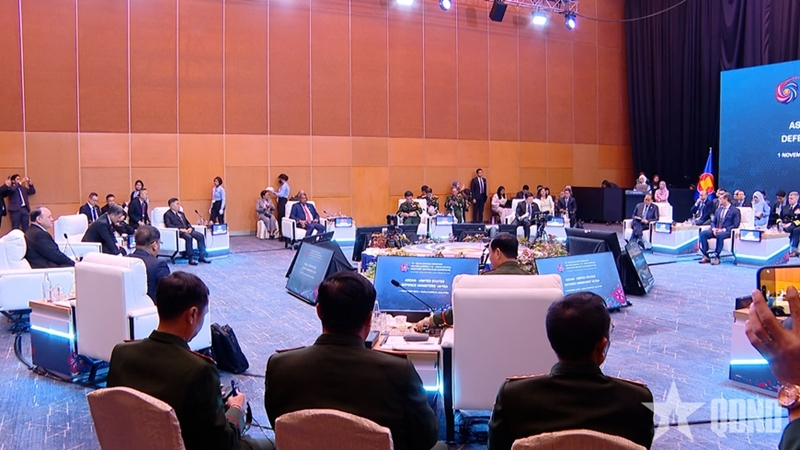 |
|
A view of the tea reception |
Regarding the East Sea, General Phan Van Giang reiterated Vietnam’s consistent position that disputes must be resolved by peaceful mean in accordance with international law, particularly the United Nations Convention on the Law of the Sea (UNCLOS) 1982. He called on all parties to exercise restraint, fully implement the Declaration on the Conduct of Parties in the East Sea (DOC), and work toward an effective and substantive Code of Conduct in the East Sea (COC) consistent with international law, including the UNCLOS 1982.
Translated by Tran Hoai